Monster

Title: Monster
Rating: 4.5/5
Genre: Psychological Drama, Horror, Thriller, Mystery
Director: Naoki Urasawa
Language: Japanese
Duration: 25 mins (74 episodes)
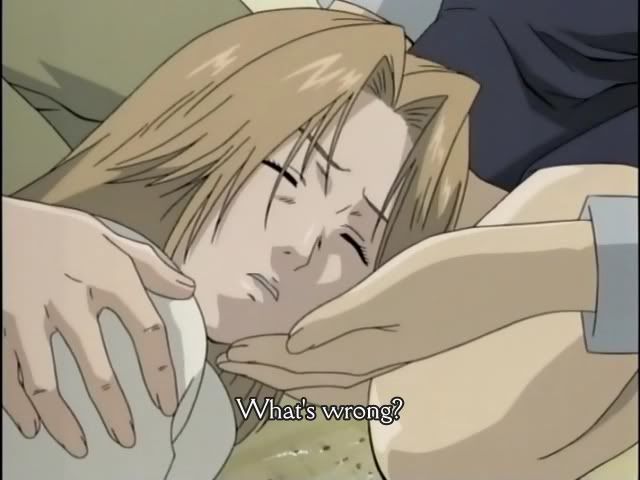 This is not a short show, and that very fact alone is usually enough to deter me, the longer shows often seeming to descend into either monotony (e.g. Pokemon) or develop a habit of spending far too long to go anywhere (e.g. Dragonball Z) but the initial premise was something that I couldn't pass upon indefinitely. Impressively, for a show with such a hefty run time it succeeds in always having direction; it never feels as though its meandering or that there's anything but a clear cut destination and whilst it takes its time to gradually unfold, slowly releasing further clues and adding new characters to complement the old, this gradual unfurling allows them to develop into intriguing subjects, leaving you guessing as to their motives, the past events that shaped them and perhaps most importantly, where they are headed.
This is not a short show, and that very fact alone is usually enough to deter me, the longer shows often seeming to descend into either monotony (e.g. Pokemon) or develop a habit of spending far too long to go anywhere (e.g. Dragonball Z) but the initial premise was something that I couldn't pass upon indefinitely. Impressively, for a show with such a hefty run time it succeeds in always having direction; it never feels as though its meandering or that there's anything but a clear cut destination and whilst it takes its time to gradually unfold, slowly releasing further clues and adding new characters to complement the old, this gradual unfurling allows them to develop into intriguing subjects, leaving you guessing as to their motives, the past events that shaped them and perhaps most importantly, where they are headed.Describing the events now that I've made it out the other side seems to be an impossible task given the wealth of events that have occurred; it's pacing is absolutely perfect though, using an inherently non-linear progression of events to show how the characters have changed through time. Taking centre-stage you have the brilliant neuroscientist, the Japanese Dr. Tenma (though working in a German hospital), grappling with the notion of the equality of life and – much to the dismay of his glory hunting superior – operates on a child before a favourable politician, saving the former but losing the latter and losing his position at the hospital as well as the hand of his gold-digging fiancée Eva Heibemann in the process. This child, however, as it readily transpires is no ordinary child but Johan; a monster capable of the most despicable actions, operating from the shadows and hiding behind a veil of deception, who makes his first
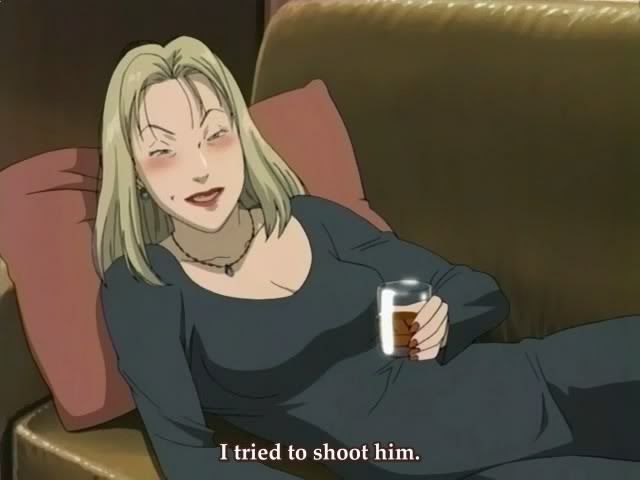 kill in this saga with Tenma's employers, quickly earning him the attention of a sceptical 'Special Agent,' Inspector Lunge, and soon becoming his prime suspect in a series of murders. And all of this is just opening the can of worms, quickly leading to a twisting tale of the German underbelly, the failed political agenda's of the former East Germany and all those affected by them.
kill in this saga with Tenma's employers, quickly earning him the attention of a sceptical 'Special Agent,' Inspector Lunge, and soon becoming his prime suspect in a series of murders. And all of this is just opening the can of worms, quickly leading to a twisting tale of the German underbelly, the failed political agenda's of the former East Germany and all those affected by them.As you might expect, much of the story revolves around the relationship between Tenma and Johan, and whilst I would make no attempt to undermine the significance of the rest of the cast, especially given that the majority of the time is spent with them acting as something of an intermediary between the two, it is some feat to create an intricate relationship fascinating enough to survive such a lengthy ordeal, but it works by pitting one against their antithesis. Tenma feels like a bastion of light to those around him, as much a giver of life to those who would surely die without his help as Johan is a devil, more than simply taking life but corrupting it, convincing them by feeding off of their paranoia and depression to take the lives of others as well as themselves. As theological as it sounds, this simple concept never falls into the tiring existential territory, instead managing to dwell on the far more real dilemma's that the characters face. Much of the psychological aspect is derived from these characters too, particularly when it comes to Johann; despite his traumatic past and apparent monstrous state as a result of his absent emotions, his actions are altogether fascinating in how they betray this very idea, leading to an inherent curiosity as we strive to put it all into context and understand the motivation behind it all.
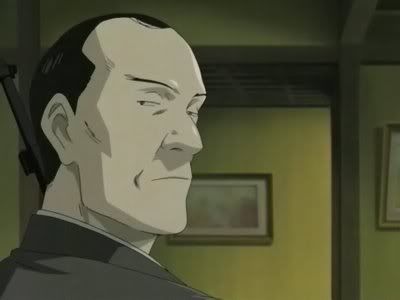 Johan is certainly the pivotal figure in this epic saga but despite this he rarely makes an appearance (although his influence is always felt); instead it is all the other characters that are somehow intertwined with his life that take precedence, and it is through them and their plot arcs that we slowly uncover the depths of his monstrous mind, developing their history so as to better understand their situation in the present and how their specific mindset relates to the matter at hand. Of the recurring characters; Nina Fortner, the young woman whose parents were murdered before her eyes; Eva Heibemann, Tenma's lover who threw it all away and declined into an alcohol fuelled depression; Dieter, the child by Tenma's side; Inspector Lunge, the BKG agent convinced of Tenma's guilt; Roberto the bodyguard, and countless others; they all have their own complex emotions and connections to be weighed up and invariably forgotten, allowing for a re-introduction to the new plot arc. Their actions always have a reason behind them, their revelations and understanding of the situation shown in perfect detail and as time goes on their characters and relationships evolve and show remorse, hope, and desperation, all put into context by the non-linear manner their story is told, taking the time to visit their past allowing us to understand their present. No stone is left unturned, and the lengthy run time facilitates this grandiose elaboration, the gradual build up of events constantly shifting between enough characters that it doesn't stagnate.
Johan is certainly the pivotal figure in this epic saga but despite this he rarely makes an appearance (although his influence is always felt); instead it is all the other characters that are somehow intertwined with his life that take precedence, and it is through them and their plot arcs that we slowly uncover the depths of his monstrous mind, developing their history so as to better understand their situation in the present and how their specific mindset relates to the matter at hand. Of the recurring characters; Nina Fortner, the young woman whose parents were murdered before her eyes; Eva Heibemann, Tenma's lover who threw it all away and declined into an alcohol fuelled depression; Dieter, the child by Tenma's side; Inspector Lunge, the BKG agent convinced of Tenma's guilt; Roberto the bodyguard, and countless others; they all have their own complex emotions and connections to be weighed up and invariably forgotten, allowing for a re-introduction to the new plot arc. Their actions always have a reason behind them, their revelations and understanding of the situation shown in perfect detail and as time goes on their characters and relationships evolve and show remorse, hope, and desperation, all put into context by the non-linear manner their story is told, taking the time to visit their past allowing us to understand their present. No stone is left unturned, and the lengthy run time facilitates this grandiose elaboration, the gradual build up of events constantly shifting between enough characters that it doesn't stagnate.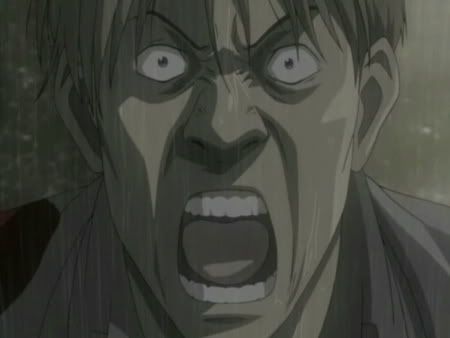 Sadly, there is a silver lining; whilst the story itself is impeccable, much of the technical aspect suffers. The animation itself is rather unimpressive, lacking in attention to detail which becomes particularly noticeable in the many backdrops utilised, and is often filled with fairly dull 'film-noir'-esque colours and a monotonous landscape. As a greater number of characters steadily come into play some inevitably start to look familiar, though this issue is certainly not the worst case I've seen and never becomes a major issue (rarely – if ever – will such similar characters come into contact, and if they should they are unique enough in their mannerisms, and in the superb voice acting from the main cast that any confusion quickly dissipates). There is a major theme of the unimportance of a name typified by the fact that throughout the series many of the characters that emerge become known by multiple aliases, which places far more weight on the viewer remembering the characters physical appearance and thus also onto how this changes with time; as old characters return after a long absence, the importance of remembering their place in the story is redoubled and the effect of not keeping up, or not watching the series in rapid succession, can quickly become problematic. Beyond the occasional short flashback there are no recaps either, and many times I found myself backtracking an episode or two just so I could recall as many of the preceding events as possible.
Sadly, there is a silver lining; whilst the story itself is impeccable, much of the technical aspect suffers. The animation itself is rather unimpressive, lacking in attention to detail which becomes particularly noticeable in the many backdrops utilised, and is often filled with fairly dull 'film-noir'-esque colours and a monotonous landscape. As a greater number of characters steadily come into play some inevitably start to look familiar, though this issue is certainly not the worst case I've seen and never becomes a major issue (rarely – if ever – will such similar characters come into contact, and if they should they are unique enough in their mannerisms, and in the superb voice acting from the main cast that any confusion quickly dissipates). There is a major theme of the unimportance of a name typified by the fact that throughout the series many of the characters that emerge become known by multiple aliases, which places far more weight on the viewer remembering the characters physical appearance and thus also onto how this changes with time; as old characters return after a long absence, the importance of remembering their place in the story is redoubled and the effect of not keeping up, or not watching the series in rapid succession, can quickly become problematic. Beyond the occasional short flashback there are no recaps either, and many times I found myself backtracking an episode or two just so I could recall as many of the preceding events as possible. The end result is a puzzle of epic proportions, not a 'mindfuck' by any stretch of the imagination but a tale that has a lot of information to convey, and with superb planning it manages to consistently pull this veil from our eyes. In fact its more reminiscent of the “puzzle gaming” genre, the point-and-click interface that captured much of my childhood with the likes of “Broken Sword” and to a lesser extent “Monkey Island,” in the manner that the story is told. It'll twist and turn and never fulfil your expectations; the humanity of each the
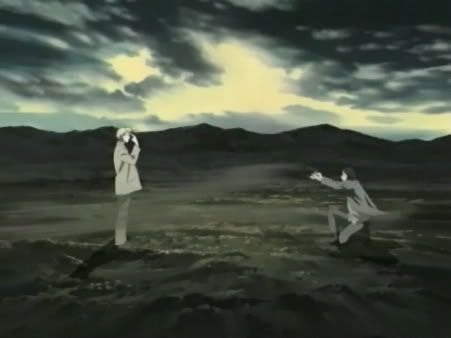 characters feels as integral to the story as anything else, as they are built up towards certain expectations of them only to tear that back down and force you to re-question everything you thought you knew about them. It may be long, the animation mediocre – if not awful towards the end – and it often struggles to find an emotional connection until the denouement; outside of the opening and closing tracks – the latter of which written and performed by David Sylvian whose dark brand of Avant-Pop seems hauntingly suited – the background music is barely noticeable; not to mention that there's no hope in hell for most of it to ever find its way onto a DVD box set any time soon, but i'll be damned if despite all this it fails to be one of the most gripping and thought provoking stories I've seen.
characters feels as integral to the story as anything else, as they are built up towards certain expectations of them only to tear that back down and force you to re-question everything you thought you knew about them. It may be long, the animation mediocre – if not awful towards the end – and it often struggles to find an emotional connection until the denouement; outside of the opening and closing tracks – the latter of which written and performed by David Sylvian whose dark brand of Avant-Pop seems hauntingly suited – the background music is barely noticeable; not to mention that there's no hope in hell for most of it to ever find its way onto a DVD box set any time soon, but i'll be damned if despite all this it fails to be one of the most gripping and thought provoking stories I've seen. 
Comments
Post a Comment